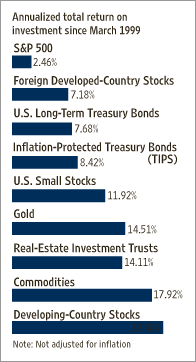The 2000s: Looking Like Another “Lost Decade” For Stocks
Conventional stock-market wisdom holds that if investors buy a broad range of stocks and hold them, they will do better than they would in other investments. But that rule hasn’t held up for stocks bought in the late 1990s or 2000.
– “Stocks Tarnished By ‘Lost Decade'” (subscription required), E.S. Browning, The Wall Street Journal, March 26
I have to say that this isn’t a great time to be in the stock market. The housing crisis that we are going through is going to put a damper on the economy that is longer than a recession. I don’t see the stock troubles ending as quickly as many people are imagining.
– Yale Professor Robert Shiller (subscription required), author of Irrational Exuberance
When you have extraordinary returns, as we did from 1982 through 1999, then usually the next 10 years aren’t very good.
– NYU Professor Richard Sylla (subscription required)
US stocks, as measured by the S&P 500, have essentially gone nowhere over the last 9 years. Almost every other asset class has outperformed large US stocks over that period, including treasury bonds, small cap stocks, commodities, gold, REITs, and international equities.

More and more the 2000s are looking like another “lost decade”, comparable to the 1930s and 1970s, in which stocks will go nowhere.
There are a couple of big reasons for this.
The first is the exceptional performance of US stocks in the 1980s and 1990s. Stocks probably got ahead of themselves in those decades and “stole” a lot the gains we might have seen this decade if things had progressed in a more orderly fashion.
The second is that the Federal Reserve has tried to prevent recessions and prop up the economy in the aftermath of the tech bubble and now the housing bubble. By flooding the economy with all this cheap money, it has created all kinds of excesses and distortions.
All this cheap money resulted in massive over investment in technology and now real estate with associated ripple effects throughout the entire economy. In all likelihood, it is going to take time to work through these distortions in the real economy and put things back on a firm footing from which our economy, and stock market, can start growing again.
I think we’re looking at at least a couple stagnant to down years before things can be put back on a firmer footing.
